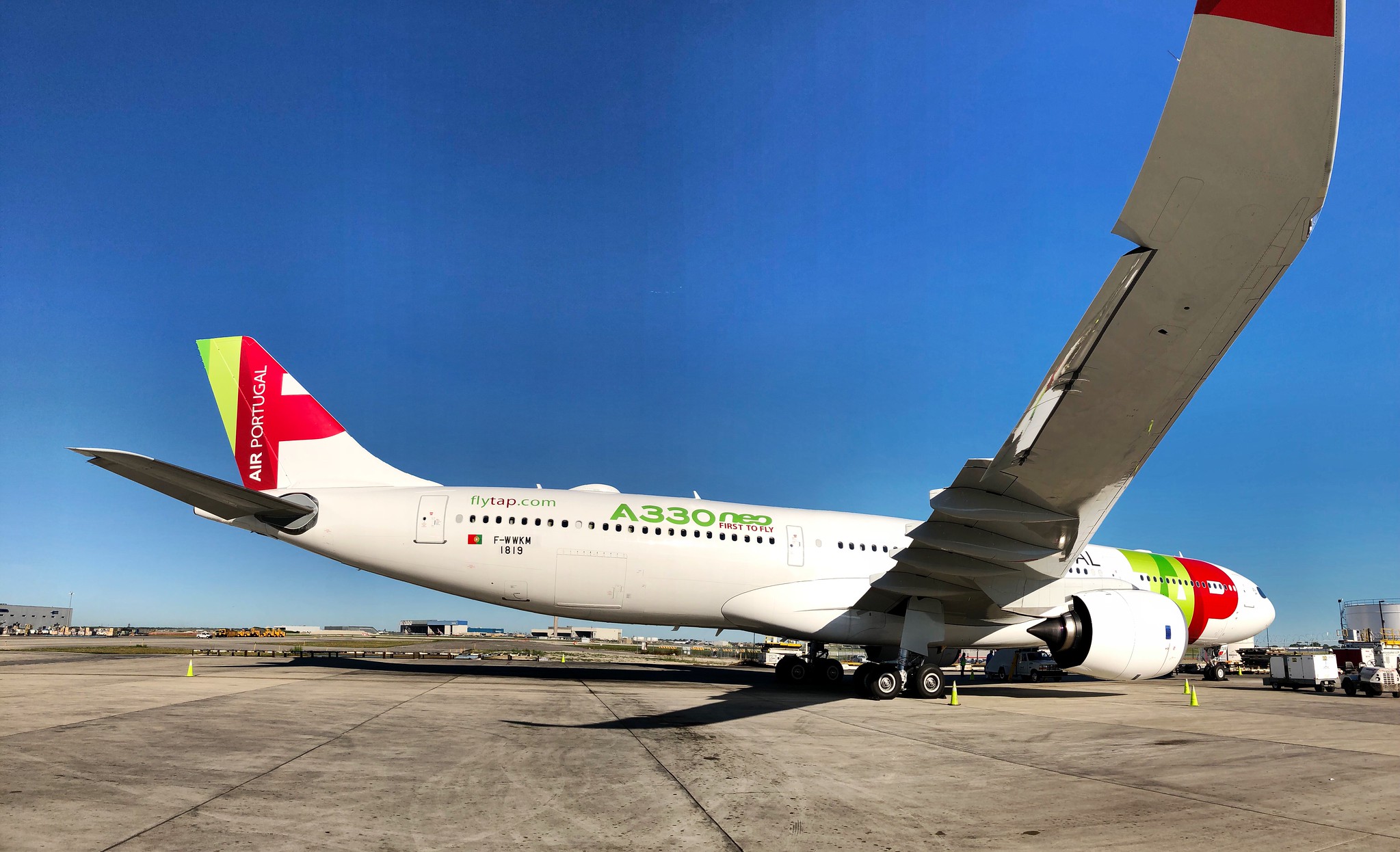Across several flights, both passengers and crew members on TAP Air Portugal have complained the A330neo is making them nauseous and even inducing vomiting. Is there something wrong with the new A330neo?
Airbus and TAP Air Portugal are quick to say no. Crew members and some passengers are saying, not so fast. Here’s what we know.
- Several crew members have been reported becoming nauseas during flight aboard the A330
- 12 reports were filed
- Passenger complaints have also been noted by crew members, including vomiting after complaining of dizziness
- This prompted TAP union members to visit Airbus HQ in late May to voice their concerns
- Airbus responded by performing a month-long investigation on the new aircraft type
- Upon completion of the tests, Airbus reported no irregularities or abnormalities
- TAP (statement below) argues that this issue is likely related to air circulation but are a normal occurrence on new aircraft
- TAP and Airbus suggest the issue is onboard temperature, not air circulation
- The National Civil Aviation Authority (ANAC) and European Aviation Safety Agency (EASA) are aware of the issue and monitoring.
If there is an issue, it certainly seems tied to the air circulation system.
TAP told Lusa, a Portuguese news agency:
In some new units of the A330neo, some odors from air-conditioning equipment may have been detected, it is considered normal in new aircraft and disappears soon after first use. [TAP] would never put its customers and workers at risk for their health.
While acknowledging that it had received complaints, TAP insisted that the issue was not serious:
The tests already carried out by both TAP and Airbus do not allow any correlation between these episodes and a hypothetical but not demonstrated deficiency in circulation and air renewal…
The A330neo is an airplane with all the certifications by the national and international authorities and totally apt for the service of transport of passengers in total safety…the cabins of Airbus are designed and manufactured in order to prevent any type of air contamination.
CONCLUSION
Mark this story as developing. Just because an issue makes headlines does not mean it is salient. Still, the month-long investigation in Toulouse indicates this an issue that both TAP and Airbus take seriously.
Have you experienced any nausea while flying the A330neo?
image: airbus777 / Flickr





Well, apparently fumes from chemicals is what is killing guest in hotels in Dominican Republic.
I am lucky enough to travel quite a bit and as i age i have noticed that i have become more sensitive to the effects of cabin pressure. In the past i have noticed on 330’s and 777’s that i suffer headaches and nausea more often than say the new type of aircraft with higher cabin pressure such as the 787 and 350’s. As such the aircraft type plays a part in my booking process these days. I imagine the pax mentioned in the article suffering similar symptoms as mine are suffering from “new vehicle” smells combined with the lower cabin pressure of the neo’s.
Aircraft fume events with many emergency landings have been going on for years. Matter of fact ALPA says 20,000 fume events in 10 year period reported by pilots they represent. Many of them – unexplained with all systems checking good.
It is all the new airplane smells that are probably causing it (glues, solvents…). Some people including me are very sensitive to certain smells. There are certain car brands I will not buy because their new car smells make me sick.
I struggle with multiple chemical sensitivities brought on by acute carbon monoxide poisoning and dread flying. I’ve been lucky in the past but I haven’t flown internationally since 2015 and even tho I have enough for 2 free flights on Delta to Europe I’m not sure I’m going to go anytime soon. (Be sure to avoid those triggers you mention as each exposure takes its toll on you. I try to avoid or leave any situation where I get ill from toxic whatever, including perfume!)
I love the transparency of the two entities with the greatest vested interest conducting the investigation.
#transparency
Decompression or monoxide poisoning are the only two medical issues aboard that would cause this in my experience, in either case they would affect everyone on-board.
What altitude is the cabin pressurised to vs other aircraft?
That was exactly what I was thinking – CO or low O2.
Is the A330 pressurized like older planes – 8000′ ASL pressures ?
I know that as I get older, I am more intune to cabin pressures – and find that flying the 787 Dreamliners and A380 + A350 are the easiest to reduce the effects of altitude flying as they pressurize at higher cabin pressure – around 5,000′ ASL.
These high tech composite planes are the best to prevent jet lag symptoms – dehydration, red eyes, nausea, and headaches
New aircraft do smell different and not always pleasant. TAP and Airbus are taking it seriously and EASA are aware.
I guess the story will probably fade and die.
We’ve seen this before. When the 777 was introduced there were two issues that Boeing and United initially denied. The first was that crew members thought there were pressurization problems with the planes. Boeing initially denied this, but then later confirmed the issue and said they were working on it. The second issue had to do with the auto pilot which would abruptly climb and descend, causing passengers to feel nauseated. That too was later acknowledged and fixed.
Grammar police alert.
The word is nauseated, not nauseous.
Sorry, pet peeve of mine.
On-topic, I’m scheduled to fly ORD-LIS on this plane in October. I’ll be keeping tabs on this. Not too worried at the moment considering the plane will no longer be new.
So TAP says that it’s normal that new airplanes make you puke? Well, I have to give them props for thinking outside the box on that one.
Does anyone know what routes they had this problem on or has it been different routes. I’m wondering if numerous planes are involved. I’m booked on Miami to Naples Italy and I’m highly sensitive to smells. Would like to avoid a potential problem. If possible.
Why is it that no one had peanut allergies in 1980? Just curious. Now we seem to be having reactions to everything. Not judging. Just puzzled.
Regarding peanut allergies: I don’t know for sure but according to what I’ve read: parents were discouraged from giving kids peanut butter for different reasons, which in turn is probably related to the increase in peanut allergy. As for the other reactions: I developed multiple chemical sensitivities (MCS) after acute carbon monoxide poisoning (almost died). I am relatively knowledgeable about MCS now after 15 yrs of dealing with reactions (trouble swallowing, headaches, for example) to even small amounts of toxins). We all are exposed to toxins throughout our lives and at some point our bodies are pushed over the edge and start reacting to small amounts. In my case, I have no allergies (to animals, food, pollen, etc). I just react to toxins in any fragranced products including perfumes, cleaning products, personal products, etc. Glues & solvents are major triggers for me too. 1/3 of people have issues with fragrance and tens of millions in the US have been diagnosed with MCS. There’s no medication or therapy for MCS at this time. For most people avoidance is the only way to avoid getting symptoms.
This is a sensationalist article with minimal factual information. How this can be considered even newsworthy is beyond me. If this issue was specific to the A330neo, other operators would have reported it, not to mention the issue would have been discovered in early long haul testing done during certification. This is just a useless piece of filler that underscores what can happen when any idiot who claims to be an aviation expert creates a website and starts slinging half truths and garbage.
Certainly Airbus and TAP Portugal are taking the matter seriously…
Gosh u leave in la la land. I am sure you scared to death about Covid but ignore the real danger of being exposed to organophosphates ( fume events ) especially on the Airbus NEO . The A330 Neo from Tap was so bad that they grounded it for a while and of course Airbus didn’t find anything coz they have enough problems with their bleed air technology. Somewhere in the world A baby bus is involved in a fume event every day. I was exposed to a nasty event on a BA 380 which diverted to Vancouver in 2016. This problems are known for over 60 years snd people die from it. Pilots have been incapacitated and I don’t even want to know how many crashes have been provoked by organophosphates exposure.
Aerotoxic Syndrome?
https://en.m.wikipedia.org/wiki/Aerotoxic_syndrome
I think Matthew should personally investigate this, in a series of flights, and report back.
I wish I could. If they opened award space tomorrow from Lisbon, I would.
For better or worse, this is the aircraft they use for the super cheap J fare, OSL-LIS-BOS, for $680. I will be probably flying this soon myself.
the only way to know the truth is to interview all the passengers that were sick-with medical data-that is TAP FLIGHT NUMBER/DATE/ TO AND FROM DESTINATIONS/ SEAT NUMBER AND TIME/AND NAME OF THE CAPTAIN/ AND THE FLIGHT HOSTESS MANAGER-then review urgently all of these data- and explain what indeed is the problem!
just saying is the air circulation, it is a new aircraft, etc., etc. it is not a valid and truthful statement-in our modest opinion.
either from TAP AIR PORTUGAL OR AIR-BUS statements!
cristovao da costa/davis/california usa
I Flew at A330 Neo from Lisbon to Sao Paulo on 31 December 2018, with my husband and 3-year-old daughter. My daughter are used to fly a lot to Brazil fro Portugal and in the middle of the flight she began to be annoyed and cried a lot, very disturbed. Me, in the end of the flight I started to feel nauseated and almost vomited, feeling very dizzy.
We went back to Portugal a month later, in january 2019 at the ame plane and I still had some symptoms of feeling sick but not as hard as the frist flight.
News today is that TAP recognised the problem stating it is is due to oil entering air con system when starting up the engines, There is an article in https://www.jn.pt/economia/interior/airbus-admite-falhas-nos-novos-avioes-da-tap-11112466.html (in Portuguese).
article translated:
Airbus reveals in a letter that it has detected problems with engine oil and air conditioning on the new A330 Neo jets purchased by TAP and that have prompted complaints. “Task Force” will investigate the origin of reported malaise.
Small drops of oil released at the start of the engine and the air conditioning system are the source of the strange smells that have been detected in the new A330s purchased by TAP, Airbus acknowledges in a letter to the airline, dated June 7, to which JN / Vivo Cash had access. But for the malaise reported by the crew – dizziness, vomiting, feeling sick, disorientation, extreme fatigue and even feeling faint – the European aircraft manufacturer remains unanswered.
“There were two different effects reported: unusual smells and symptoms of discomfort, there being no correlation between the two factors,” he says.
“During the flight test phase, we identified that starting the engine could generate odors in the cockpit,” explains Airbus, adding that in continuous use over 100 seconds, “a few drops of oil could be released from the high pressure compressor “, which would cause” oil smell during the taxi, take off and climb “phase.
Measures do not lock
The company says that it has already taken two measures to mitigate this effect, both on land and during the take-off of the airplane. It adds in the letter sent to TAP that these data would be shared with the European Aviation Safety Agency (EASA) at the end of June.
But that’s not all. “During the early stages of service, the air conditioning system was identified as another source of odors,” says Airbus. This phenomenon is related to the air outlet temperature from the high pressure compressor that interacts with the coating (a kind of primary anti-corrosion paint). And explains that this situation has also been mitigated with anti-scale treatments and increased air circulation for the aircraft in operation.
“Although these two sources have been addressed, reports indicate that odors are still present,” with Airbus assuming that “we can not rule out other potential causes for the problem.”
“With respect to smells, a task force has been formed with the help of our suppliers.” The technical investigations are already underway to explore an exhaustive list of potential causes of the problem “. And he adds that “mitigating or permanent solutions are being adopted”.
Already the sickness reported by crew members – the crewmember’s union (SNPVAC) threatened to go ahead with a strike if there are no effective measures to solve the problem – remain a mystery. “Airbus is working closely with the [TAP] operator who registered these events.”
The pilots are worried too. In a letter written by SPAC, to which JN / Dinheiro Vivo had access, the pilots’ union says that it “has been following with great apprehension” the phenomenon of odors and vapors in the new airplanes.
I just experienced this. Flight from Toronto to Lisbon on an A330neo. Many people fainting and vomiting. I fainted in the galley and am currently in a Lisbon hospital having learned I have broken my leg. A great start to my first ever family vacation.
I fly all the time for work and have never fainted, vomited or seen 10+ others do so on a flight. Something is wrong!